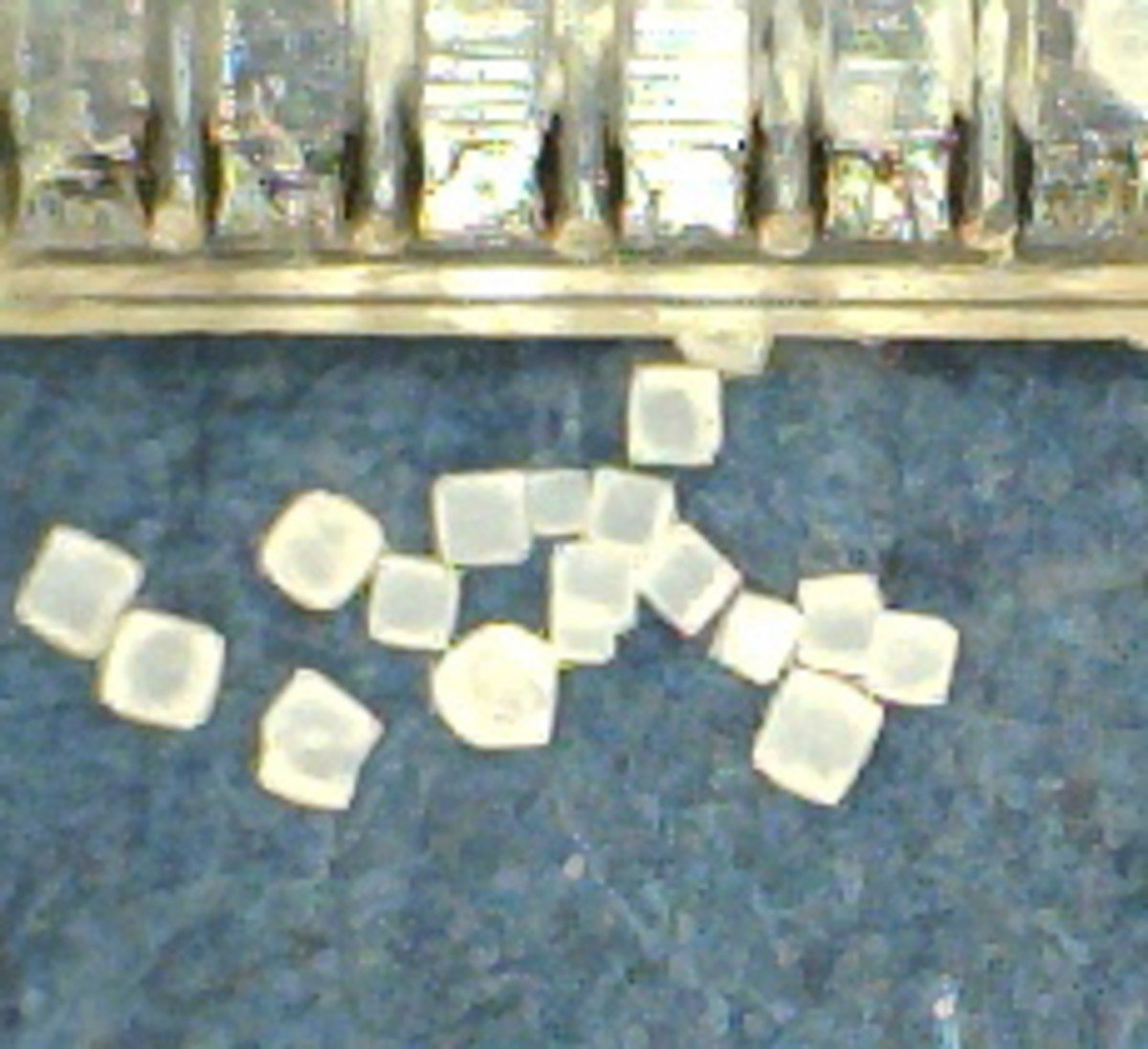Take It With a Pinch of Salt!
The World Uses Millions of Tons of Salt Every Year

A Frenchman Loves You "More Than Salt!"
Salt: We can't live without it, and, apparently, can't live well with it - at least too much of it. Salt has been valued by man for several Millennia: we have sold it, fought-over it, and saw it being taxed by kings and governments. Revolutions began over it and the stuff has been used in religious ceremonies. No wonder the French don't say, "I love you more than life," but "I love you more than salt!" Such is the value this Gallic race puts on this prosaic crystal.
I want to clear up one point before we continue. Salt is not sodium and sodium is not salt. Sodium is an extremely unstable and dangerous metal element. Salt is sodium chloride and a stable, relatively benign substance. Salt occurs when the sodium ion in water is counterbalanced by the chloride ion; the result is salt after evaporation. The sodium ion is a component of many minerals. I don't want to take this into a chemistry lesson and send everyone to sleep so will leave it there.
Perhaps because we all began in the oceans is the reason all life needs salt. Now we are constantly being told - at least in the First World - that we crave and use it far too much; that salt causes high-blood-pressure, water retention, heart and circulation woes and early death. But you only have to go to any restaurant in the Britain and the USA to see people ignoring medical advice and pouring the stuff onto food that often already contains far too much.
Despite its popularity and presence everywhere food in consumed, only a small percentage of the world's output goes to the food packaging and to the private consumer in the home. Most is claimed by industries for a myriad of uses. Chlorine, hydrogen and sodium hydroxide can be extracted by running an electrical current through a strong solution of salt and water. These products, having many uses in their own right, can be combined with each other and other substances to make scores of products used today. I don't intend to explore even a fraction of the uses made by substances extracted from salt, but here's a few.
Chlorine is not only used to purify the water in your swimming pool, but is used to manufacture household bleach, plastics, and many synthetic products. The petro-chemical industry also needs chlorine for refining. Recently, concerns over chlorine and chlorine-dioxide's safety in the environment has led to less salt being used specifically in these industries.
As most will know, salt is really Sodium Chloride, formed as sodium reacts with hydrogen gas and chlorine, which allows the crystals to form. Sodium is an abundant element found in the stars as well as on Earth where it appears as Feldspar, among other host substances. Commonly, it appears, and is described as, a soft metal, as is potassium also. Sodium has some extraordinary properties, not least that it is lighter than water and can be cut with a knife. Extremely reactive, it is usually kept in a liquid to prevent it combining with other substances and causing effects such as fire and explosions. One of the commonest uses you can see every day as the sun goes down is the yellow illumination in street lighting from gaseous sodium glowing in a special tube.
Salt is obtained by three main methods: from rocks, called Halite, evaporated from the sea - Sea Salt - or from Natural Brines.
Salt we use in the UK (especially this winter and last!) from rocks is actually Rock Salt, crude and polluted with sand, etc., produced specifically for icy roads. England and Ireland have huge reserves of salt, as do other neighbouring countries. The USA and Canada have huge salt reserves, as do many Far Eastern lands. Salt domes, pressing upwards from deep under the Earth's crust are commonly found in the presence of oil and gas. One of the strangest manifestations are "Salt Glaciers," such as some found in Iran's mountains, these are domes which push through to the surface and then act like ice glaciers.
Some salt appears as huge "pans," like that at Bonneville in Nevada where it has become famous for speed trials or cars and motorbikes. The largest in the world covers more than ten- thousand square kilometres (4,000 sq. miles), "Salar de Uyuni," Bolivia.
Some seas are much richer in salt than others: the most remarkable is the "Dead Sea" where higher life forms cannot exist due to the high salt content. Seawater has less salt towards the poles and more in confined seas, such as the Mediterranean.
Normal ocean water contains about 1% to 5% solids, most of which is sodium chloride. "Sea Salt" is often preferred by the gourmet food industry, as well as some private consumers, especially the cosmetics industry.
Natural deposits of once fresh water now high in salts, etc., are known as "Brines," as part of the Dead Sea and large deposits in North America, (Death Valley).
Many tropical and sub-tropical areas produce salt by the evaporation of salt water by the sun. Mexico's Baja Peninsula has one huge mine operated by the Japanese, on the edge of the desert and the Pacific ocean. Thousands of tons per week can be obtained from these "mines" as the sun shines 24/7 in this desert environment, the province of whales and a few tourists come to see them.
Without salt providing extra-cellular fluid in our cells, they could not function. Salt also acts as a preservative in foods by actually drawing the liquid out from potentially harmful bacteria preventing them from reproducing. Explorers found salt was toxic to leeches, causing them to curl up and fall off when liberally applied.
Today’s table salt also usually contains magnesium carbonate to help it flow smoothly and traces of iodine to prevent simple goitre.
In 2009 there was 260 million metric tons of salt produced world-wide, principally by China, USA, Germany, India, Mexico and Canada.
Salt, or its derivatives, is found in pesticides, epoxy resins, cleaners, shampoos, toothpaste, and soap. It is used by the paper industry, textile businesses for dyes, the huge detergent companies use it by the hundreds of tons. In fact, we are wasting our time here: it is almost true to say every industry uses salt; failing any other application, you’ll find it in the staff canteen!
So important has this simple substance become, known as NaCi in the chemical table, that it has found its way into the lengua franca of man through the centuries. We say, “He’s not worth his salt,” he is the “Salt of the earth.” If we don’t really believe something, you can, “Take it with a pinch of salt.” Someone having spent his life at sea is “An old salt.” We "salt" our money away in the bank. If you add insult to injury, you may be accused of "Rubbing salt into the wound." Someone showing bravery is said to have "Plenty of salt." There is even a drink called “A salty dog,” based on vodka and grapefruit juice.
Wild and domestic animals need salt just as man does and will actively seek it out in rock formations or saline pools and mud, licking until they are satisfied. Large blocks are provided for farmers with other additives for the health of stock.
Occasionally, armies have suffered ill-health through lack of salt. Napoleon lost thousands of men on his retreat from Moscow because of his men’s lowered resistance to disease and the inability of their bodies to recover from injuries.
A rare manifestation of death from lack of salt is the incidents of people drinking so much liquid, they leach all the sodium from their bodies and die from “Hyponatremia,” literally water intoxication.
Well, hubbers, remember, “I love you more than salt.” Until it’s time for some fish ‘n’ chips, that is!








